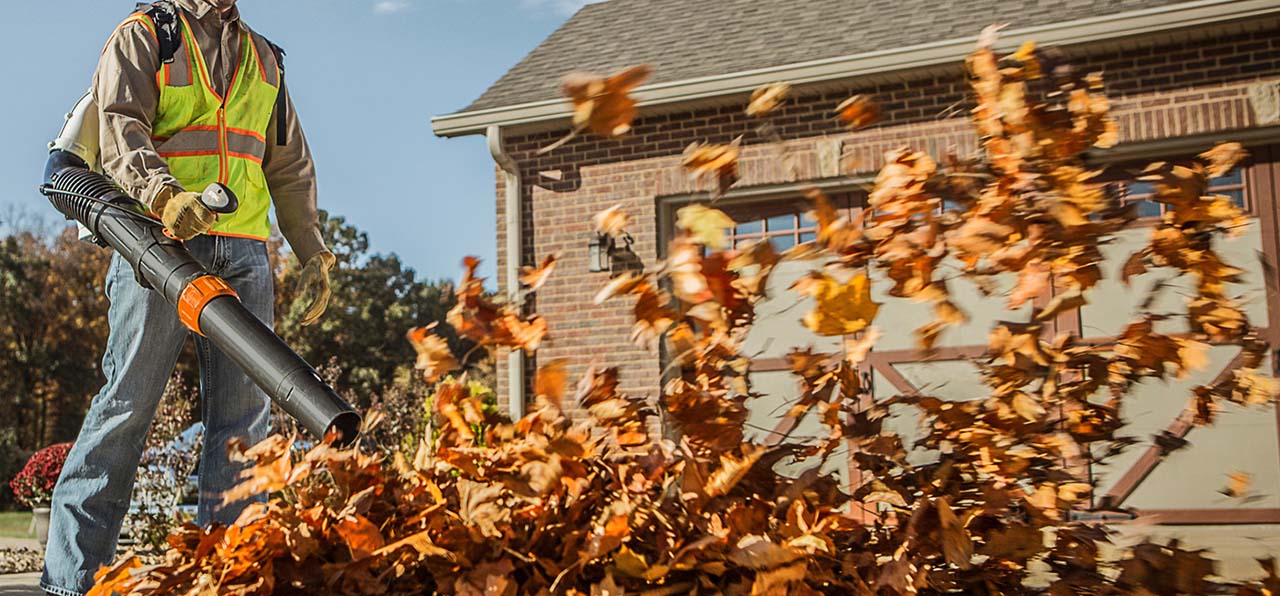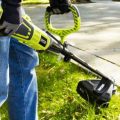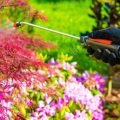Table of Contents
Landscaping takes many forms and mowing the lawn is just one element in maintaining a pristine garden.
With fall comes the menace of leaves all over your garden and often using a rake is not the most practical or effective option.
In today’s backpack blower reviews, we’ll look at a simple but ingenious solution to help you keep your garden looking at its very best without straining yourself or eating up too much time.
Here’s a quick snapshot of the 5 backpack blowers we’ll explore in more detail:
Backpack Leaf Blower Reviews
We’ll get directly down to business with our reviews. After presenting 5 of the best leaf blowers on the market, we’ll walk you through how to focus on getting the most appropriate blower for your needs.
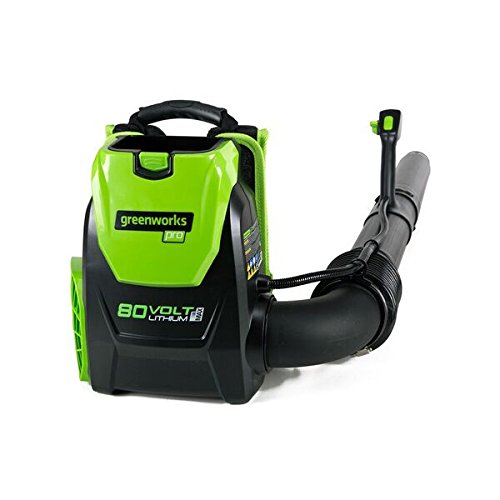
First up in our best backpack blower reviews is a powerful cordless electric from the highly reputable Greenworks.
This blower is part of the line of 80V MAX equipment so the lithium-ion battery can be switched out across your range of Greenworks gear.
This makes it something of a mixed blessing…
If you already have a battery and charger in place, buying the bare tool is pretty cheap considering the performance you get for your money. If, on the other hand, you need to buy everything in one package, it’s borderline expensive.
Coming in at just over 14 pounds including the battery, you’ll be able to slip the blower onto your back without fatigue setting in. You’ll enjoy all of the freedom of movement that comes with a cordless unit but you will need to think about run time…
Lithium-ion batteries are a distinct improvement on the old nickel-cadmium workhorses but they are still far from perfect. Under light use at a low speed, you should get around 30 minutes of run time on a single charge. One way to get around this is to purchase a second battery but that obviously ratchets up the cost. That said, charging time is only 30 minutes so if you don’t mind breaking off for a cup of tea mid-flow, it’s not the end of the world when you run out of suction.
Our best advice is to angle for the Greenworks only if you have a smaller garden and leaves from just a tree or two. For heavy-duty work in a big yard, check out one of the gas backpack blowers we review instead.
Performance is surprisingly strong for a battery-powered blower. The air flow is rated at an extremely impressive 580CFM which puts it close to many gas models. The air blows at a rapid 145mph so you’ll get a lot more bang for your buck than you’d get with a handheld blower.
The brushless motor starts up at the press of a button sidestepping all the hassle involved with a gas blower. There’s an ergonomic trigger that allows you to adjust the speed according to the situation. Running this as slowly as you practically can will cut down on noise while also prolonging the length of duty you’ll get on a single charge. If you have a larger and more repetitive job to take care of, cruise control is a wonderful touch.
Greenworks does itself proud on the warranty front. Offering you coverage for a full 4 years, you really can’t ask for much more in terms of a guarantee of quality. After all, no manufacturer expects to lose out by serving up these generous terms. Look after this blower well and it will last you for many years of leaf blowing.
We should point out a very small flaw where some users have reported a degree of lag in hitting high power from start-up. Bear this in mind and expect a second or so before you reach full steam. This minor gripe aside (along with the run time issue that blights all cordless electric appliances of any stripe), there’s very little else we can say to knock this fine backpack blower.
Take a swift look now at where the Greenworks backpack blower stands and falls before deciding whether to pony up for this superb piece of kit…
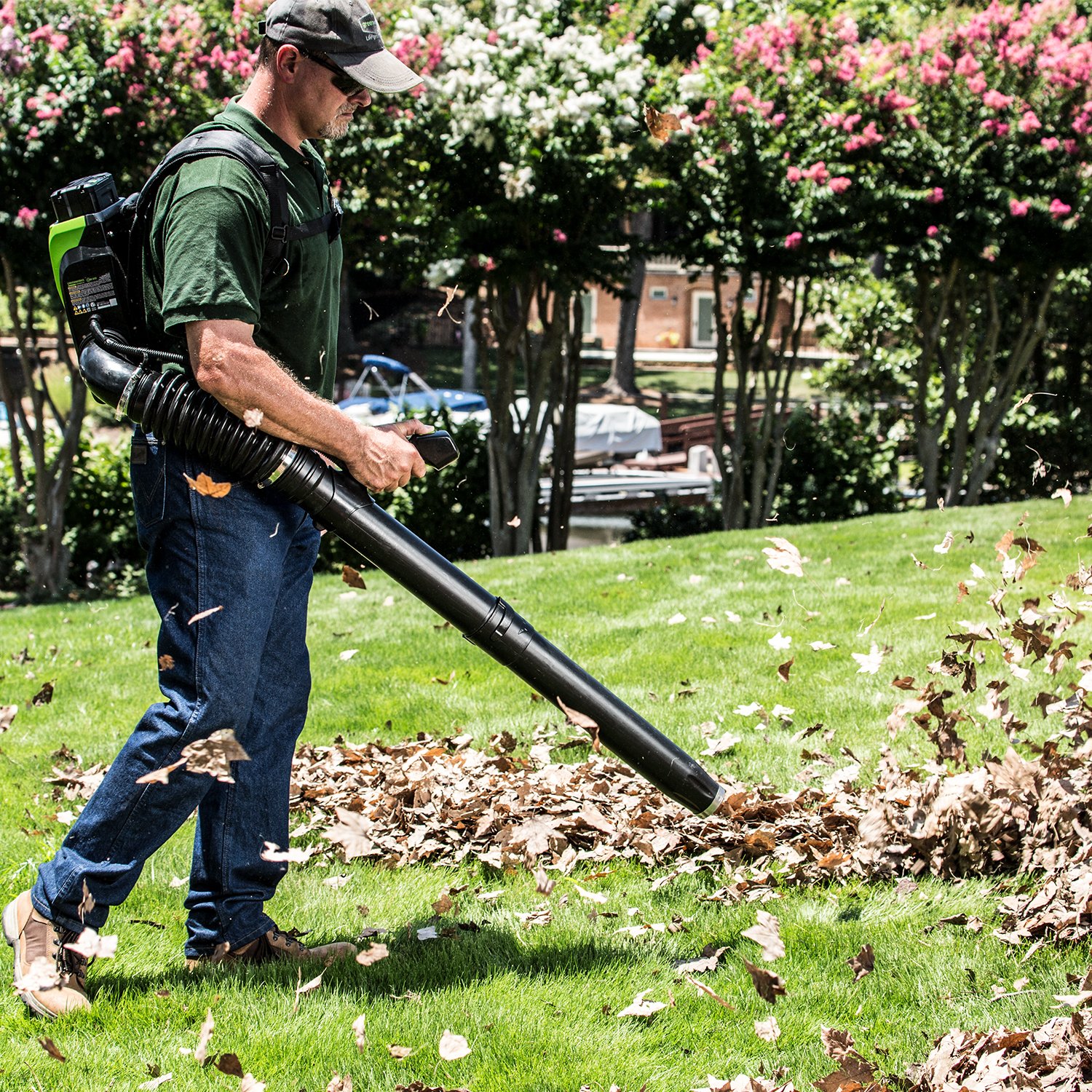
Pros.
- Bare tool represents great value for money so ideal if you already have a battery and charger
- Start-up is straightforward with no cord to deal with and you’ll enjoy all the freedom of a cordless appliance
- Up to 30 minutes of run time on very low speed but much less if you operate at pace so bear this in mind if you have a large area to clear
- 580CFM air flow and 145mph speed serves up much more power than the average handheld blower
- Highly capable brushless motor delivers the power you’d expect from a gas-fueled blower without the drawbacks of noise and emissions or the ongoing running costs
- Tweak the pace with variable-speed trigger and a nifty turbo boost function
- If you’re working for extended periods, cruise control lets you focus on the job at hand and work in comfort
- Outstanding 4-year warranty allows you to buy without worrying about expensive repair bills
Cons.
- If you opt for the model with battery and charger, this is a fairly pricey blower
- Slight lag from starting up to full power but this is an inconvenience rather than a deal-breaker
- Not ideal if you have a larger yard to deal with due to the need to recharge after 20 to 30 minutes of use
Conclusion
Opting for a cordless electric backpack blower always involves a certain amount of compromise. The negatives we flag on this model concerning run time and the expense of the battery are not really specific faults of the Greenworks but more general issues with battery-powered blowers.
It’s all about horses for courses when you’re looking for a leaf blower. If you have a smaller garden and you want a relatively quiet and efficient piece of kit that kicks out more than ample power without demanding much by the way of maintenance, the Greenworks 80-volter is a sterling choice.
That class-leading 4-year warranty is the finishing touch on a capable package that lets you slip on the backpack unit and see off your leaves quick-smart.
Check out the Greenworks today for an eco-friendly leaf blowing solution that won’t cost an arm and a leg.

If you thought that all gas-powered backpack blowers were prohibitively expensive, think again. The Poulan Pro is extremely keenly priced without working you over with sub-par performance.
The 2-stroke engine will need a mixture of oil and gasoline so if you are not the most practically-inclined gardener, the hassle factor of this blower doesn’t make it the best choice. If, however, you don’t mind getting your hands dirty or undertaking a bit of routine maintenance, you’ll enjoy all the rewards of a powerful gas blower without needing to spend a fortune. Kicking out 48cc, this blower is suitable for heavier-duty work and works well in larger gardens since you won’t have the same run time limitations as you’ll get with a cordless electric variant.
Air flow is rather underwhelming for a gas-guzzler coming in at less than 500CFM. Still, the speed of the air blown out tops 200mph and we can’t knock the overall performance. You’ll be able to use the variable speed throttle and match the pace of work to the application at hand for superior results and a longer lifespan not to mention less noise if you keep it dialed back. We should point out that when running at full clip the Poulan Pro is not the quietest blower.
The nozzles are nicely angled so that even if you need to dig out leaves that have worked their way into the ground, this blower will take everything in its stride without feeling overburdened.
Build quality is first-rate and the frame feels very solid. The trade-off for this is that the Poulan Pro tips the scales at over 20 pounds so it’s not the nimblest blower on the block. Make sure you’re comfortably wielding this kind of weight to avoiding buying a blower that will remain unused in the toolshed.
This blower is not just built to stay the distance but it feels like a pleasure to use as well. The padded straps on the harness are simple to adjust so the unit fits closely whatever your size. The backpack arrangement distributes the weight evenly so it doesn’t feel overly bulky despite its less than lightweight nature. The non-slip handle is comfy enough to grab hold of for prolonged spells without undue discomfort setting in.
This blower, although very competitively priced, is cut out for larger gardens or even lighter-duty commercial work. While in life you usually get what you pay for, there’s also an exception to every rule. The Poulan Pro is a classic example of a cheap product that punches well above its weight.
Whether you want to suck up leaves into neat piles, clean out your clogged guttering, blast your soiled workshop or even get rid of snow in the winter, investing in the Poulan Pro gives you the opportunity to deal with a broad spread of applications in one neat package.
Although not the best warranty in terms of length, you’ll be covered for 2 years after purchase which is more than you could expect for a budget gas blower and nothing to complain about.
Glance now at the principal pros and cons before we drill down with our verdict on the Poulan Pro backpack blower…
Pros.
- Incredible value for money considering it’s a gas-powered backpack
- Poky 2-stroke engine develops 48cc and delivers air at speeds of 200mph
- Rugged and durable frame is built to withstand a little punishment without letting you down
- Make micro-adjustments with variable speed throttle and take full advantage of cruise control for a seamless experience
- Back and shoulder harness with padded straps is fully customizable for the perfect, nish fit
- Soft handle grip enhances maneuverability and lets you work for long spells without blistered hands
- Great for a range of applications from leaves to dust, snow and more challenging debris
- Angled nozzles maximize cleaning power even when leaves and debris are deeply embedded
- 2-year warranty gives you peace of mind when purchasing
Cons.
- 475CFM of air flow is rather disappointing for a gas blower
- Weighs 22 pounds so not the lightest blower up for grabs
- Extremely noisy when operating at full throttle
Conclusion
For a superb entry-level gas-powered backpack blower, the Poulan Pro comes very well reviewed with just cause.
Although the air flow output could be improved, the 200mph speed of this blower harnesses to a reliable and efficient 2-stroke engine means you can get plenty of work done double-quick.
Unlike with a cordless electric blower, you’ll be better able to work over large areas with the Poulan Pro. All you need to do is top up the gas and you’ll be good to go for as long as you’re comfortable working. For a winning mix of affordability, blowing speed and multi-purpose functionality, the Poulan Pro deserves its place on any list of the best backpack blowers. Check one out today!

As we hit the mid-point in our backpack blower reviews, we’ve got another adaptable and accomplished gas-fueled beauty, this time from the industry legend Husqvarna.
Founded back in the 17th century, Husqvarna is one of the world’s oldest companies and their attention to detail is immediately apparent across all the products they peddle.
This is not the cheapest in Husqvarna’s wide range of blowers but we always try to include something for all tastes and budgets when we collate our products to review. If price is your prime motivator, check out some of their cheaper alternatives or look into some of the other models we review here. If you are looking for a powerful gas blower you can use for landscaping contracts as well as at home in the garden, read on…
Performance figures are everything with backpack blowers and the Husqvarna doesn’t disappoint. The air speed is measured at 180mph giving you more than enough oomph for even demanding clean-up jobs. The 50cc engine packs over 2 horsepower and maxes out at 7500RPM. While some other blowers might boast a higher air flow rating – the Husqvarna nudges 500CFM – or slightly more raw speed, this blower is more than up to any reasonable job you throw its way.
The engine is not just effective but efficient into the bargain. You’ll enjoy lowered emissions and improve fuel consumption while being able to enjoy the ultimate in power and speed when conditions dictate.
The fuel tank is generously sized and you’ll be able to fit over 40 ounces of gasoline in so you won’t need to keep breaking off in the middle of your work.
If you’re dealing with bigger clean-up projects, the cruise control common to most blowers is a feature you’ll appreciate. Focus on the job at hand without worrying about constantly manipulating the speed.
The harness comes with shoulder straps and a hip belt so everything sits nicely in place and is padded for your convenience. This set-up is expressly designed for an even distribution of load and comes ventilated so your back doesn’t end up saturated with sweat or strained as you make light work of all rogue foliage in your garden.
Starting a gas blower can be tiresome but Husqvarna has simplified the procedure nicely. The air purging makes sure there’s no air lingering in the carburetor or fuel system rendering start-up a straightforward affair.
Although the warranty could be more generous, there’s an inducement to extend this up to 4 years. In order to qualify, you need to purchase a trio of 32-oz pre-mixed fuel when you buy your blower so think of this as a money-saver also guaranteeing further peace of mind.
We normally frown upon this type of hard sell but let’s face it, you’ll need the fuel anyway so you might as well capitalize on this deal for the double win.
Pros.
- 2.1HP engine generates 7500RPM along with air speeds nudging 180mph and an air flow of almost 500CFM so you’ll get a dependable and poky beast capable of dealing with even stubborn piles of leaves fuss-free
- X-Torq technology means a drop in fuel emissions and consumption but also promotes extra power on tap
- Substantial 42-oz fuel tank offers plenty of run time before you need to reach for the gasoline
- Adjustable, soft handles allow you to exercise complete control
- Integrated harness and hip belt offers a comfortable and relaxed fit
- Backpack section helps to evenly disperse the load and is ventilated to ensure you comfort remains uppermost
- Cruise control is a boon for extended work periods when you don’t want to constantly monitor and regulate the speed
- Durable enough to use for long, unbroken spells without overheating or becoming bogged down
- Ideal for large residential gardens or lighter commercial undertakings so a highly versatile piece of kit
Cons.
- Weighs in at over 22 pounds so reasonably bulky
- Over 100 decibels of noise so think seriously about your intended usage and whether this will bother the neighbors
- 1-year warranty is a slight disappointment
Conclusion
Not everyone wants the cheapest backpack blower nor does everyone want a super-lightweight cordless which often lacks the power of a gas-fueled alternative.
If you have a large garden with plenty of fallen foliage or perhaps a small landscaping business, you’ll need a leaf blower that’s man enough for the job. This is where the Husqvarna steps in.
The 50cc X-Torq engine delivers more than enough power for prolonged use in demanding conditions. Not only this, you’ll notice a distinct reduction in both fuel economy and noxious emissions meaning you can do your bit for the environment without needing to sacrifice blowing power.
If you want a solid and long-lasting backpack blower from a brand you can totally rely on, pop the Husqvarna on your shortlist.
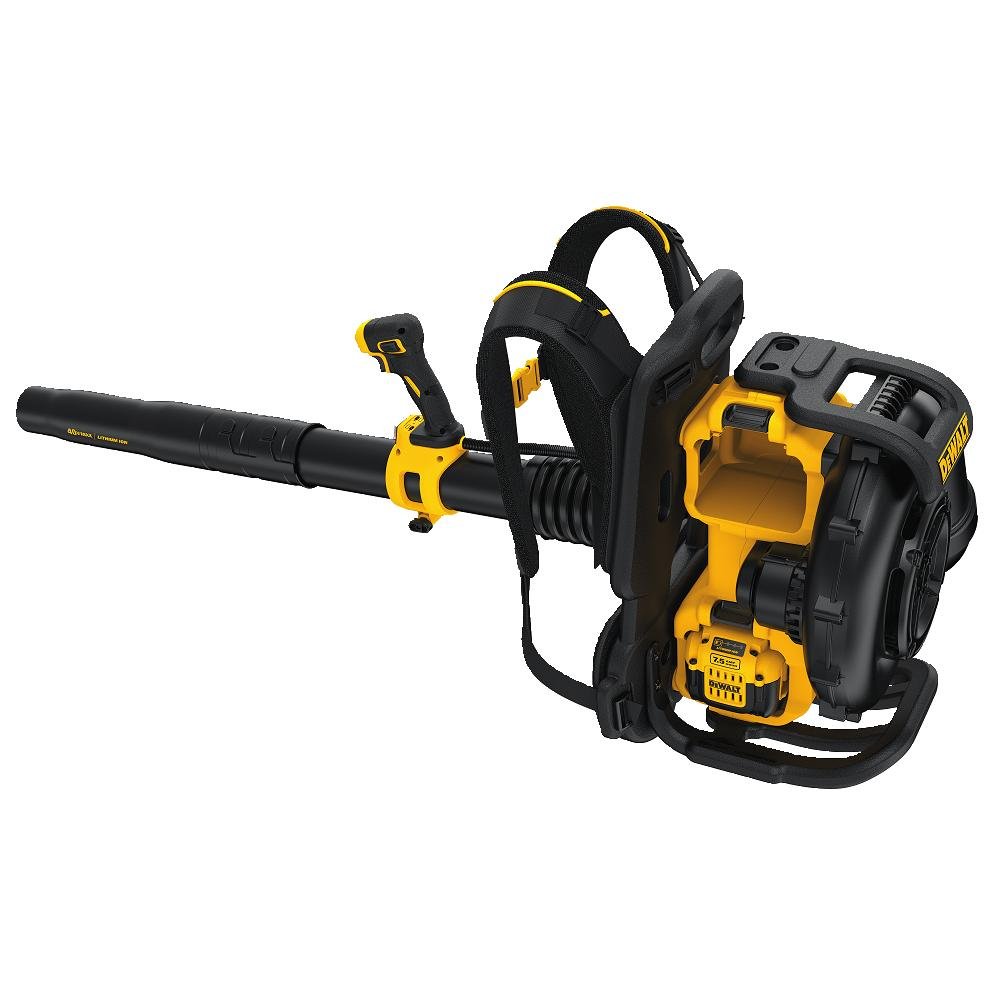
Opinion is polarized over whether electric or gas blowers are the best bet and we have to say it depends entirely on circumstance.
There’s simply no right or wrong answer. If you think that a more subdued battery model makes sense for your gardening requirements, the DeWalt is a solid choice that will not disappoint.
Part of the 40V MAX lithium-ion range, you’ll be able to interchange your batteries between tools which can save you money in the long run. If you’re already part of this family and fancy buying the bare tool, the DeWalt comes in at a pretty commendable price point. If you opt for the package with 2 batteries, it’s an expensive undertaking. That said, you’ll still save money over a 3 year period when compared to a gas blower with its associated running costs.
You’ll have room for a pair of batteries with this blower. Each of them will yield up to 20 minutes of run time and that’s operating at full clip in challenging conditions. You’ll bleed even more life from them if you reduce the power and you’re engaged in light leaf blowing duties. You’d be well advised to do this since charging each battery takes a couple of hours meaning 4 hours of down time if you run out of juice completely.
Controlling this backpack blower is a pleasure thanks to the joystick which can be pushed backward or forward to sit well however long or short your arms might be. This is a nice touch if different family members plan to use the blower. You can make adjustments tool-free with a simple nut sitting underneath. Unlike the lock-on cruise control on many competing blowers, the Speed Lock calls for you to hit a button when you want to activate this feature then press it again to disable it.
Air is pushed 450CFM at an impressive enough 142mph which is actually superior to the performance kicked out by an entry-level gas mower and more than sufficient for a blower of this size and intended use.
Weighing 27 pounds, you might want to think twice about the DeWalt if you struggle with heavier loads. That does assume 2 batteries in place so you can knock this down to 22 pounds with a single lithium-ion saddled up.
The DeWalt’s harness is adjustable but the absence of a hip strap means that balance could certainly be improved.
Unchecked power, especially if you don’t even need it, is far from the only thing to consider when you’re looking for the best backpack blower. Many people want a unit which doesn’t destroy the hearing of anyone within earshot. The DeWalt is rated at just over 60 decibels which makes it fairly quiet, at least as far as most leaf blowers are concerned.
Take a look at a breakdown of the chief upsides and the couple of minor snags with the DeWalt and decide for yourself whether this is the best backpack blower for you…
Pros.
- Bare tool is a cheap option and as part of the DeWalt 40V MAX range you can swap out the battery among your various power tools and save money over time
- Lithium-ion battery and brushless motor gives you a powerful and maintenance-free blower with none of the running costs of a gas model
- 20 minutes of full-power, continuous run time from each battery so adequate for most reasonable needs
- Very quiet in operation rated at just 63 decibels so complies with most noise regulations
- 450CFM of air at a speed of over 140mph is fairly handy for a cordless electric blower
- Joystick controls inject an element of fun into a droll job like cleaning up leaves
- Speed lock feature acts like cruise control and gives your finger a rest when working on larger clean-up jobs
- Room for 2 batteries so get more done before needing to charge up
- Superb 3-year limited warranty accompanied by 2 years of free servicing
Cons.
- If you need to buy the battery and charger, this is not a cheap proposition
- No hip strap means weight is not distributed as effectively as it could be
- Charging time of 2 hours per battery is a disappointment
Conclusion
It’s pointless comparing cordless electric backpack blowers head-to-head with gas alternatives as it’s an apples and oranges scenario. What we can say is that the DeWalt acquits itself admirably against other comparable battery-powered blowers without falling wildly short of the power you’d expect from a gas-guzzler.
This company has a hard-won reputation for producing a wide range of power tools and sundry appliances that combine affordable pricing with top-tier performance. We would say that while this blower is good value if you already have a couple of batteries and charger in place, needing to buy the whole package will run you a fair bit and you might be better placed to consider another blower entirely.
For anyone who already owns 40V MAX tools and is in the market for an ultra-quiet and uber-dependable backpack blower that’s actually fun to use, we can’t recommend the DeWalt highly enough.
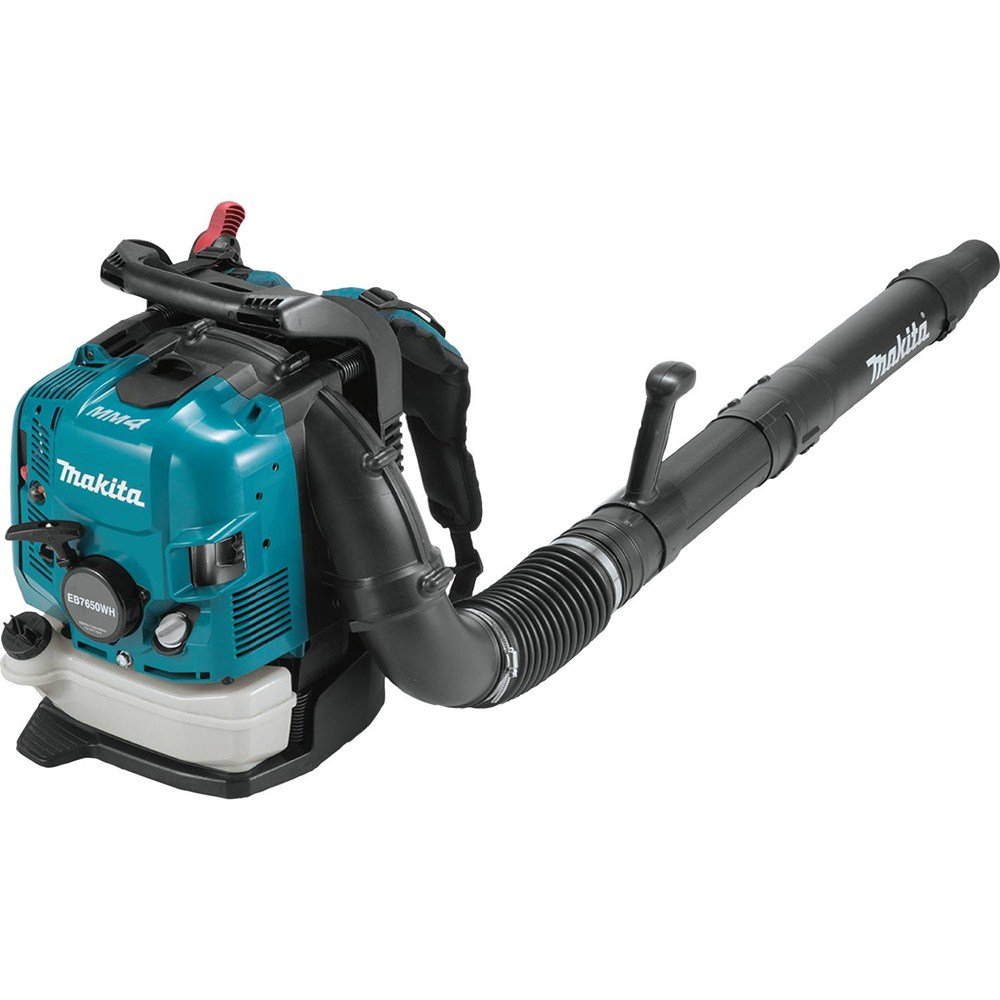
We’ve tried to include a comprehensive selection within these 5 backpack blower reviews and we’ll round out with a really heavy-duty leaf blower from Makita which is not cheap but arguably represents the best overall value of all these units we’ve looked at today.
One of the niggles of many gas blowers is that their 4-stroke engines are tiresome to fuel up with a mixture of oil and gas not to mention hard work to maintain. The Makita packs a heavy-duty 2-stroke engine that sidesteps this ceremony completely. The 75cc powerplant is rated at 3.8HP and is more than capable of fueling even commercial work without feeling overworked.
Another common bugbear with gas-powered engines is a tricky start-up. With automatic engine decompression, you can fire up the Makita without standing on ceremony.
The 200mph air speed and exceptional 670 cubic feet per minute of air flow see this blower outflank most of its close competitors by some distance. Despite this high-flying performance, the backpack blower only comes out at 24 pounds all-in so you won’t feel like you’re humping around a lead weight.
With so much power up your sleeve, you might be concerned about vibration. Makita takes care of this through the use of mounts sandwiching the frame and engine and tamping it down to an acceptable level. Noise is not the issue you might fear either. This blower is rated at just over 70 decibels thanks to a substantial and effective muffler so while no leaf blower is whisper-quiet, the Makita is certainly not bothersome either.
You can make alterations to the handle without reaching for your tool kit. The hip throttle packs cruise control functionality. The only gripe we have is that the throttle is situated rather too near to the On/Off switch so be careful not to slash the power when you’re looking to step things up a gear.
The backpack itself is a pleasure to wear. The shoulder straps boast multiple adjustments so whatever your shape or size, you can work in comfort using this sterling leaf blower.
Air filters on leaf blowers have a tendency to play up and become clogged due to the nature of the work they carry out. The substantial filter on the Makita is easy to access and clean. You can also replace it with ease so that’s one less thing to worry about in your quest for an immaculate garden.
If you have a larger garden at home, especially one where lots of trees ditch their leaves, the Makita is tailor-made for easing your passage away from the rake. Due to its build quality and hard-hitting performance, this blower is also eminently suited to much more hardcore professional work so whether you’re a contractor or a home owner, this leaf blower is a smart choice.
Explore a brief summary of the pros and cons of the Makita backpack blower before we deliver our verdict and move on to a brief buying guide…

Pros.
- Powerhouse 75cc commercial-grade engine develops 3.8HP
- 4-stroke demands no tedious mixing of gas and oil
- 670CFM and 200mph puts this machine firmly in the professional category without costing a fortune
- Weighs 24 pounds which is more than acceptable considering the performance on tap
- Get less vibration thanks to mounts between engine and frame so work without being shaken to pieces
- Flick between summer and winter mode for enhanced output whatever the conditions
- Relatively quiet at just over 70 decibels so get the job done super-quickly without menacing the neighbors
- Oversized grip means comfortable, balanced operating positioning
- Alter the position of handle swiftly and tool-free for a seamless experience
Cons.
- Throttle and On/Off button are set too close together for comfort
Conclusion
Everyone has varying requirements and preferences when it comes to leaf blowers. For some, a quiet and environmentally-friendly blower fit for occasional use makes the ideal companion. Others demand something much more rugged with the capability of performing serious blowing duties.
If you fall into the latter category, we’d seriously recommend road testing the Makita hip throttle backpack blower.
You’ll get all the power you need for commercial clean-up projects while it’s quiet and maneuverable enough to use in the garden at home.’
For anyone still on the fence about buying a gas-powered blower, the 4-stroke engine on the Makita takes a lot of the sting out of proceedings since you won’t need to mess around with a fuel mixture and you can roll with straight gasoline for a user-friendly experience.
This backpack blower is flat-out the best we have tested and we would urge you to consider this if you’re looking for the most effective backpack blower currently available without needing to take out a bank loan or deafen everyone in the surrounding area!
OK ...
Now you have a solid idea of what the best backpack blowers look like, we’ll move on to our detailed buying guide so we can help simplify your purchasing decision.
Forewarned is forearmed!
Backpack Blower Buying Guide
While the primary focus of today’s article is on backpack blowers, we’ll walk you through all aspects of leaf blowing now including a very brief glance at the other options at your disposal. Our key aim is to provide you with all the information you need to get the right gear for your garden. If that happens to be a handheld or walk-behind blower, it’s better you find that out before making an expensive mistake.
So first thing’s first…
What’s the point of a backpack blower in the first place?
Do You Need A Backpack Blower?
The most important part of any purchasing decision should take place long before you put your hand in your pocket. You should always kick off with a frank and honest appraisal of your needs so you don’t end up filling your garden shed with a welter of equipment that never sees the light of day.
If your garden measures up at less than a quarter-acre and you have just a couple of trees shedding their leaves, a rake is the smartest, most cost-effective solution.
For anyone with a more substantial garden who doesn’t fancy manually raking for hours on end, a backpack blower makes perfect sense.
Ask yourself what type of debris collects in your garden. If it’s just leaves, a rake is more than fit for purpose. If you have grass clippings around your plants, pine needles collecting in your gutter or dust in your workshop, though, a blower is the obvious weapon of choice.
Be honest with yourself and only buy a backpack blower if it’s necessary rather than just taking a fancy to the look of these Ghostbusters-style strap-on appliances!
Leaf Blower Terminology
There’s nothing worse than looking to buy any product and being assailed by unfamiliar terminology.
We’ll summarize a few key elements you’ll encounter time and again on the trail of the best leaf blower…
- CFM: The power of a leaf blower is referred to in cubic feet per minute (CFM). The higher the CFM rating, the more air is exiting the blower. This translates to increased power zapping leaves and other debris
- MPH: The speed at which the air leaves the blower is listed in miles per hour (MPH). Obviously, the greater the speed, the more efficient the blower
- dBA: Noise is measured in decibels (dBA). In certain areas, there will be a threshold for noise levels so make sure you are compliant and don’t end up with a blower that kicks up too much of a racket and leaves you open to further action
- Reduction Ratio: If your chosen blower is capable of mulching, the quoted reduction ratio corresponds to how many bags of leaves will be turned into a single bag of mulch
Types of Leaf Blower
The first choice you’ll encounter involves the method by which your blower is powered. They can be divided into 2 broad categories:
- Electric Leaf Blower
- Gas Leaf Blower
We have selected both electric and gas models in our backpack blower reviews so there’s something for everyone.
We’ll take a look now at the pros and cons of these various blowers…
Electric Leaf Blower: Corded
Generally weighing in at 8 pounds or under, these lightweight corded blowers are designed to be used one-handed. Since they don’t carry the added weight of a battery, these models are among the most portable and you will also enjoy uninterrupted run time without needing to head to a charging unit.
Start-up is as simple as hitting a button and you won’t be plagued by any noxious emissions if you go for an electric blower.
The obvious downside of a corded garden appliance is the need for an extension cable and the restrictions of being tethered to an outlet. The cable can also be a trip hazard.
Electric Leaf Blower: Cordless
Cordless blowers are still pretty light but, with the addition of a battery, they often weigh up to 10 pounds.
You’ll get none of the restrictions of a power cord or the noise and emissions that comes with a gas blower.
On the flip side, though, don’t expect the same power as you’ll get with a gas-guzzler and be prepared for limited run times and the need to factor recharging into the equation. One way to combat the annoyance of running out of juice is to invest in a second battery.
Gas Leaf Blower
If you want a superb combination of flexibility, freedom of movement and minimal restrictions when it comes to run time, a gas-powered leaf blower is your leading option.
Gas-fueled blowers are not for everyone, though. This is why we have also included electric models in our reviews. These beasts come into their own for larger gardens of ¼ acre and above. They are also ideal for sustained, heavy use. If you want to use a leaf blower for commercial purposes, a gas model is the only sensible choice.
With more power and increased coverage, gas blowers are not without their drawbacks. They tend to be much heavier units so be sure you can comfortably handle the weight. Start-up is often a drag and maintenance can be tiresome. You’ll have more running costs with fuel to consider and gas blowers are also pretty noisy.
So…
Once you’ve doubled down on the powerplant that best gels with your garden and your personal preferences, it’s time to think about the style of blower.
Backpack, Handheld or Walk-Behind Blower?
There are 3 main designs of dedicated leaf blower on the market.
Although we are focusing purely on backpack blowers in today’s reviews, it bears mentioning the other varieties so you can be sure of getting the right tool for the job.
- Backpack Blower: Backpack blowers bridge the gap between handhelds and walk-behinds offering a nice happy medium served up with a healthy shot of convenience. Although most backpack blowers are gas-powered, more and more electric versions are coming to market and we break some of those down today. They normally run anywhere from 400 to 700 CFM and they work very well if you need to clear larger areas. The backpack assembly means there’s much less effort involved on your part with maximum power returns
- Handheld Blower: A cheap and cheerful handheld blower is a step up from a rake but will lack the power for heavy-duty jobs and won’t have the staying power if you want to use your blower on a prolonged and regular basis. For small clean-ups in a city lot, they are more than fit for purpose but they fall outside the scope of today’s article
- Walk-Behind Blower: The third style of blower is a full-blooded wheeled walk-behind model, again not something we’ll dive deep into here today. Kicking out up to 3000CFM, you’ll get a huge amount of power and performance making them perfect for commercial clean-up jobs
In addition to these categories, you can also find combination tools that will convert to a vacuum, mulcher or string trimmer.
Hopefully you now have a clear idea of which type of power and which style would be the optimum addition to your gardening arsenal.
We’ll give you a few handy hints now on using a leaf blower before rounding out with what to take into account when you’re buying one…
The Best Way To Use and Maintain a Leaf Blower
Using a leaf blower is a very straightforward process.
If you use your blower to gather up small piles of leaves that you then rake onto a tarp or sheet of plastic, you’ll end up getting the job done more efficiently than trying to work with larger piles.
You should always use ear protection since even the quieter models still make a fair amount of noise.
Electric blowers, whether corded or cordless, demand very little by the way of ongoing maintenance. Keep it dry and don’t batter it around too much and that’s about the extent of your care requirements.
Gas blowers, on the other hand, need a little more TLC…
Before using your gas backpack blower, check it has the correct mixture of gas and oil. Ensure the air filter is not clogged.
While you’re using your blower, make sure not to knock it around. Go easy on the throttle and use the slowest practical speed to get the job done to avoid excessive wear and tear.
After you’ve finished up, clean your blower down using a dampened cloth to get rid of any caught-on debris. Check the air filter and remove any clogged up matter. Store in a cool, dry place.
Final Things To Look Out For When You’re Buying a Leaf Blower
Once you’re drawn up your shortlist of blowers, here’s a quick checklist that might come in handy…
- Nozzle Design: The nozzle can be flat, rounded or sometimes you’ll get the option of both variants. Flatter ends work best when dealing with loose leaves. A more rounded tip is highly effective at digging out embedded foliage
- Speed Control: Whether it’s a variable throttle on a gas blower or a choice of speeds on your electric model, you’ll enjoy maximum flexibility if you can fine-tune the pace. Amp it up if you’re working on hard surfaces and open ground then dial it back if you need to dance your way around delicate flower beds
- Transparent Fuel Tank: With gas models, a translucent fuel tank takes the guesswork out of refueling and prevents you from being cut off mid-flow and needing to dash off for some more gasoline. If you have a choice, opt for a model with a wider opening as well. This will lessen the likelihood of potentially dangerous fuel spills
- Weight and Ergonomics: Always pay close attention to the weight of the blower so you won’t end up straining your back working with it. Some handheld models feature secondary grips to enhance control. Reading plenty of user reviews is a good way to get a feel for the blower if you can’t actually road test it in person
- Safety Shut-Off Switch: With any garden appliance, safety should be uppermost. On/off switches allowing to instantly kill the power should be prominent and easy to access to keep you safe in the event of any mishap
- Air Intake: If you opt for handheld rather than a backpack blower, shoot for a side-mounted air intake. Intakes mounted underneath are quite likely to suck at your clothing
- Noise Levels: Be aware that leaf blowers generate a fair amount of noise. You should always wear ear protection yourself and be respectful of neighbors in terms of the times you use your blower. Dialing back on the throttle minimizes the sound to some extent so be courteous and think about others while you’re blitzing your leaves and garden debris
A Final Word
We very much hope you’ve found some useful nuggets in these backpack blower reviews.
Getting one of these multi-purpose tools is a great way to ensure your yard remains debris-free year round. From leaves and dirt through to snow if the mercury drops, the best leaf blower makes a wonderful attachment to your toolshed.
Feel free to get in touch any time if you have any queries or feedback at all. We’re in the process of building out the site so it becomes a one-stop shop for everything home and garden related.
We’re very receptive to suggestions and we’re here to give you exactly what you want. Don’t be shy, drop us a line!
